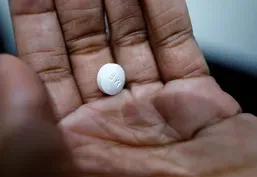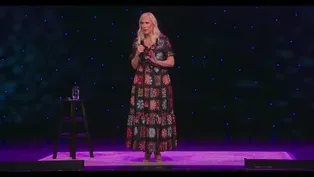
Deal allowing Ukraine to export grain extended
Clip: 5/17/2023 | 5m 58sVideo has Closed Captions
Deal allowing Ukraine to export grain extended, easing fears of worsening food shortages
Russia agreed to extend a deal that allows Ukraine to export grain to the rest of the world. The agreement between Russia, Ukraine, Turkey and the U.N. is a lifeline at a moment of global food insecurity. It’s also a rare moment of agreement as the war in Ukraine rages on ahead of an expected counteroffensive. Nick Schifrin reports.
Problems with Closed Captions? Closed Captioning Feedback
Problems with Closed Captions? Closed Captioning Feedback
Major corporate funding for the PBS News Hour is provided by BDO, BNSF, Consumer Cellular, American Cruise Lines, and Raymond James. Funding for the PBS NewsHour Weekend is provided by...

Deal allowing Ukraine to export grain extended
Clip: 5/17/2023 | 5m 58sVideo has Closed Captions
Russia agreed to extend a deal that allows Ukraine to export grain to the rest of the world. The agreement between Russia, Ukraine, Turkey and the U.N. is a lifeline at a moment of global food insecurity. It’s also a rare moment of agreement as the war in Ukraine rages on ahead of an expected counteroffensive. Nick Schifrin reports.
Problems with Closed Captions? Closed Captioning Feedback
How to Watch PBS News Hour
PBS News Hour is available to stream on pbs.org and the free PBS App, available on iPhone, Apple TV, Android TV, Android smartphones, Amazon Fire TV, Amazon Fire Tablet, Roku, Samsung Smart TV, and Vizio.
Providing Support for PBS.org
Learn Moreabout PBS online sponsorshipGEOFF BENNETT: Today, Russia agreed to extend a deal that allows Ukraine to export grain to the rest of the world.
The agreement between Russia, Ukraine, Turkey, and the U.S. is a lifeline in a moment of global food insecurity.
Nick Schifrin is following these developments and joins us now.
So, Nick, how did this green deal extension come about?
And I should say, I said it involved the U.S.
I should have said the U.N. NICK SCHIFRIN: No, absolutely.
Turkish President Recep Tayyip Erdogan announced that Russia had decided unilaterally to extend this deal by 60 days.
And, as you said, U.N., as well as Turkish negotiators, had really been trying to negotiate furiously ahead of tomorrow's deadline to get Russia to do a longer extension.
Moscow has been asking for concessions, claiming that this deal doesn't allow it to sell its own grain and its fertilizer to the rest of the world, something the U.S., by the way, denies.
But even only at 60 days.
Geoff, as you know, this deal is so vital.
Ukraine has historically been a breadbasket for the world, especially when it comes to corn and grain.
Some 345 million people around the world are food-insecure.
And access to this Ukrainian grain really can help prevent hunger, even famine, especially in the Horn of Africa.
GEOFF BENNETT: So this grain deal, as you said, it's a rare agreement as the war continues.
We know that Russia, in recent days, they have stepped up their missile attacks.
How is Ukraine dealing with that, confronting it?
NICK SCHIFRIN: Yes, it's an incredible stepping up by Russia because of how they're trying to attack Kyiv and Ukraine's critical infrastructure.
They have been using the Kinzhal.
That is one of its most advanced weapons.
That is a hypersonic weapon.
It was unveiled about five years ago by Russian President Vladimir Putin in great fanfare.
He said that it could fly Mach 10, which means 10 times the speed of sound.
It would be launched from Russian jets, as you're seeing.
This is Russian Defense Ministry video right there.
Putin called that weapon that you're seeing right there -- quote -- "invincible."
And the assumption was that it could avoid air defense.
But it turns out that it's very vulnerable to an air defense system called the U.S. Patriot, which the U.S. has only recently delivered to Ukraine.
A defense official confirms to me Kinzhals did do some light damage to a Patriot missile, but the Patriots were able to shoot down about half-a-dozen hypersonics.
And I asked David Wright of MIT, who explained that the reason the Patriot was able to shoot the Kinzhal is actually less about the Patriot and more about the Kinzhal itself.
DAVID WRIGHT, Massachusetts Institute of Technology: What people tend to forget is that the high-speed Mach 10 is really the maximum, the top speed that they reach, and that they slow down as they reenter the atmosphere.
So as they dive toward their target, they hit very thick atmosphere, and that tends -- the drag tends to slow them down.
And by the time they get to low altitudes, they're going slow enough that I had actually predicted that a Patriot might be able to shoot them down.
And it appears that Ukraine has shown that now.
NICK SCHIFRIN: And if that's the science, the reason this is important for Ukraine, it's proven that Russia with even its most advanced missiles cannot be guaranteed to hit Kyiv's critical infrastructure.
And that's incredibly important, both for the country, but also ahead of this counteroffensive that we're expecting the U.S. officials telling me has begun in earnest with what are called shaping operations, mostly attacks inside occupied territory, including with a long-range British missile called the Storm Shadow that's just been delivered.
In the coming weeks, Geoff, we expect a barrages of artillery from Ukraine to begin ahead of a ground offensive with newly arrived Western weapons and training.
GEOFF BENNETT: Meantime, Nick, President Biden left today for the G7 gathering in Japan.
But because of the debt ceiling negotiation, he canceled visits to Australia and would have been the first ever visit by a sitting president to Papua New Guinea.
What's been the reaction to that?
NICK SCHIFRIN: Officially, understanding.
The Australian prime minister today said he understood why President Biden had to cancel.
And, last night, the White House hosted ambassadors from Pacific countries.
And it was described to me that the room responded with understanding as well.
But remember why the visit, especially to Papua New Guinea, was going to be so important.
The U.S. has been trying to expand its footprint in the Pacific beyond its two huge bases to a handful of locations -- and you see the location of Papua New Guinea there off the coast of Australia -- in order to complicate Chinese war planning really across the region.
And during the visit, President Biden was expected to sign, with Papua New Guinea's prime minister, a defense cooperation agreement that would have eventually gotten U.S. troops stationed in Papua New Guinea and around Papua New Guinea.
Now, White House and regional officials say that that agreement is not in peril.
But, Geoff, as you know, remember what the White House argues, that democracies can deliver, the U.S. can deliver, despite domestic political dysfunction.
And what China will argue is that, no, U.S. domestic politics can interfere with U.S. commitment to the region, according to Zack Cooper of the American Enterprise Institute.
ZACK COOPER, American Enterprise Institute: What leaders in Asia are looking for as the United States to be a reliable partner.
And that means showing up sometimes, even when we have domestic challenges.
And I think there will be a lot of questions about, look, the debt ceiling, we knew roughly when it was going to be a problem.
And so why did we schedule a whole series of meetings when we knew that these negotiations were going to go up to the last minute?
And, alternatively, if, as the president said today, they have agreed that they're not going to default, then why can't the president stay in Asia?
NICK SCHIFRIN: U.S. officials are trying to get Secretary of State Antony Blinken there.
But, bottom line, Geoff, the U.S. and China will continue their competition for the region.
GEOFF BENNETT: Got it.
And, Nick, we should acknowledge that, starting this week, you are taking some time off for paternity leave.
NICK SCHIFRIN: I am.
(CROSSTALK) GEOFF BENNETT: You will be dearly missed.
NICK SCHIFRIN: Thank you, Geoff.
GEOFF BENNETT: But we wish you and Camilla and your growing family all the best.
NICK SCHIFRIN: Thank you so much.
Appreciate it.
GEOFF BENNETT: Fantastic.
Appeals court hears arguments in mifepristone case
Video has Closed Captions
Appeals court hears arguments in case over access to mifepristone (9m 1s)
Cambodian refugee's restaurant provides space to heal
Video has Closed Captions
Cambodian refugee's restaurant provides space to heal and celebrate culture (3m 5s)
Comedian Leanne Morgan on her unusual road to success
Video has Closed Captions
Comedian Leanne Morgan on her unusual road to success and new Netflix special (7m 21s)
Data shows disparity in excess deaths among Black Americans
Video has Closed Captions
Data shows massive disparity in excess deaths among Black Americans (6m 20s)
Tulsa faces reckoning over historical racism
Video has Closed Captions
Tulsa faces reckoning over historical racism as state law restricts how history is taught (14m 54s)
Providing Support for PBS.org
Learn Moreabout PBS online sponsorshipSupport for PBS provided by:
Major corporate funding for the PBS News Hour is provided by BDO, BNSF, Consumer Cellular, American Cruise Lines, and Raymond James. Funding for the PBS NewsHour Weekend is provided by...
















